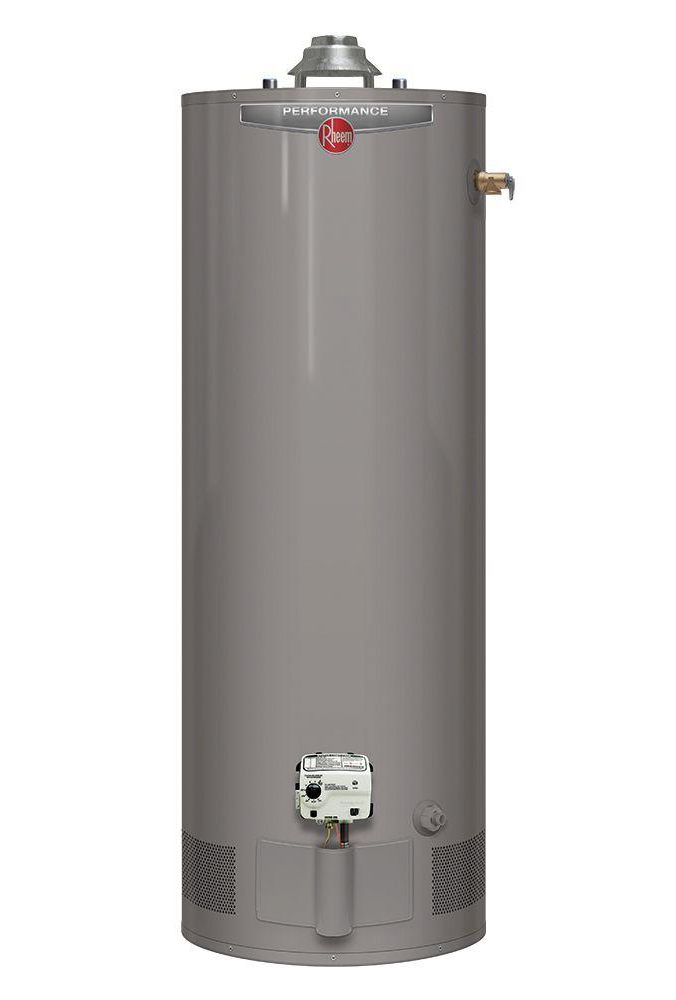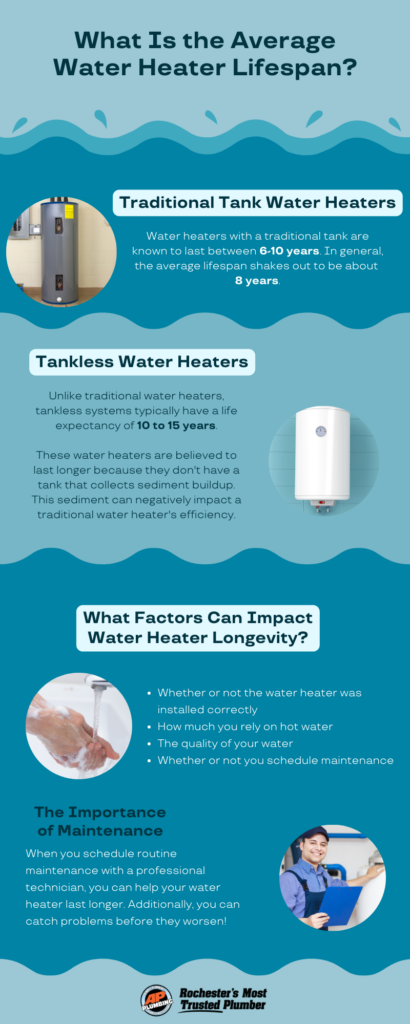Have you ever wondered how long your gas water heater will last? Understanding the average life expectancy of a gas water heater can save you from unexpected cold showers and costly repairs.
By knowing when it’s time for a replacement, you can avoid the hassle and ensure your home runs smoothly. You’ll discover the typical lifespan of gas water heaters and learn how to extend their life. Get ready to dive into practical tips that will keep your hot water flowing effortlessly.
Keep reading to empower yourself with the knowledge you need to make informed decisions about your home’s comfort and efficiency.

Credit: handhsupply.com
Page Contents
Gas Water Heater Lifespan
Gas water heaters usually last between 8 to 12 years. Regular maintenance can help them live longer. Many factors affect their lifespan. Quality of the heater is important. Better quality often means longer life. Hard water can damage heaters quickly. Soft water is gentle on heaters. Proper installation also matters. A well-installed heater works efficiently. Good ventilation is crucial. It prevents gas buildup. Annual check-ups are helpful. They catch problems early. Replacing parts keeps heaters working. Older heaters need more care. Watch for rust or leaks. These signs mean trouble. Fix them fast to avoid bigger issues.
Factors Influencing Longevity
Quality and Brandmatter a lot for water heaters. Top brands use better parts. This helps heaters last longer. Cheap brands might use weak parts. Such heaters break faster. Good brands offer warranties too. This gives peace of mind.
Installation Qualityplays a key role. Skilled workers install heaters correctly. This prevents leaks and damage. Poor installation leads to early issues. Hiring experts is wise.
Maintenance Practicesare crucial for long life. Regular checks prevent big problems. Cleaning and servicing are essential. Neglect reduces heater lifespan. Owners should follow care instructions.
Water Quality Impactis often overlooked. Hard water harms heaters. Minerals can cause blockages. Soft water is kinder to heaters. Using filters can help. Keeping water clean extends heater life.
Typical Lifespan Expectation
Gas water heaters at home last about 8 to 12 years. Regular maintenance helps them last longer. Check for rust or leaks often. Change the anode rod every few years. This part keeps the tank from rusting. It’s important for a long life. Smaller families may find their heater lasts longer. Less use means less wear and tear. Always keep the temperature at a safe level. This saves energy and helps the heater last.
In business places, gas water heaters last 5 to 8 years. More usage means more wear and tear. Regular checks are important. Look for leaks and rust. Change parts when needed. High demand can shorten lifespan. Use the right size heater for the job. Smaller units may break faster in busy places. Keeping temperatures safe is key. It saves energy and helps heaters last longer.
Signs Of Wear And Tear
Leaks are a clear sign of trouble in gas water heaters. Rust on the tank means metal is wearing away. Water may escape from these weak spots. This can cause damage to floors and walls. Rusty water is also a bad sign. It shows the inside of the heater is corroding. Regular checks can help spot these issues early.
Water temperature should stay steady. Fluctuations mean something is wrong. Water might be too hot or too cold. This can make showers uncomfortable. It could also mean parts inside the heater are failing. Checking the thermostat might help solve minor issues.
Strange noises can come from the heater. These may include pops, bangs, or hisses. Noise often comes from sediment build-up. When sediment heats, it makes popping sounds. Regular flushing can reduce noise and sediment. This keeps the heater running smoothly.
Extending The Lifespan
Regular checks help keep the gas water heater strong. Cleaning is important for parts. Sediments can build up and block the system. Inspecting the heater for leaks is a good practice. Change the anode rod when worn. It stops rust and keeps the tank healthy.
Fix problems quickly to avoid bigger issues. Listen for strange noises. They can mean trouble. Watch for leaks around the heater. Replace old parts to keep it working well. Delay repairs and the heater might break.
Hard water can harm the heater. Water softening systems help. They remove minerals that cause problems. Less mineral buildup means longer heater life. Consider installing a system to protect your heater.
When To Consider Replacement
Gas water heaters need care. Repairing them often is a problem. Frequent repairs mean more money spent. This is not good. It’s better to buy a new one. Less trouble and less cost.
An old heater may use more energy. This means higher bills. Inefficient heaters take longer to heat water. This wastes time. A new heater works faster. Saves money and time.
Heaters get old like people. Most last about 10-12 years. Older ones might break often. New ones are safer and better. Check the heater’s age. If old, think about replacing it soon.
Choosing A New Gas Water Heater
Energy efficiency saves money on bills. Look for Energy Star labels. These heaters use less gas. They are better for the environment. Using them helps the planet. Always pick the most efficient model you can find.
Think about how much hot water your family needs. Small families may need a smaller heater. Big families need a bigger one. Check the gallons per minute rate. This tells how much hot water it gives. Get the right size to avoid running out of hot water.
Some heaters have smart controls. These can be set from your phone. Automatic shut-off is another feature. It stops leaks quickly. Self-cleaning helps keep the tank clean. These features make life easier and safer.

Credit: www.searshomeservices.com

Credit: applumbing.com
Conclusion
Gas water heaters usually last 8 to 12 years. Regular maintenance extends their life. Clean your heater to prevent problems. Replace worn-out parts promptly. Pay attention to signs of aging. Rust, leaks, or odd noises mean trouble. Consider a replacement when repairs get costly.
Choose a new model wisely. Energy-efficient options save money in the long run. Consult professionals for expert advice. They help you make the right choice. Remember, a well-maintained heater serves you longer. Enjoy warm showers without worry. Keep an eye on performance.
Make informed decisions for comfort and safety. Your home deserves the best care.
